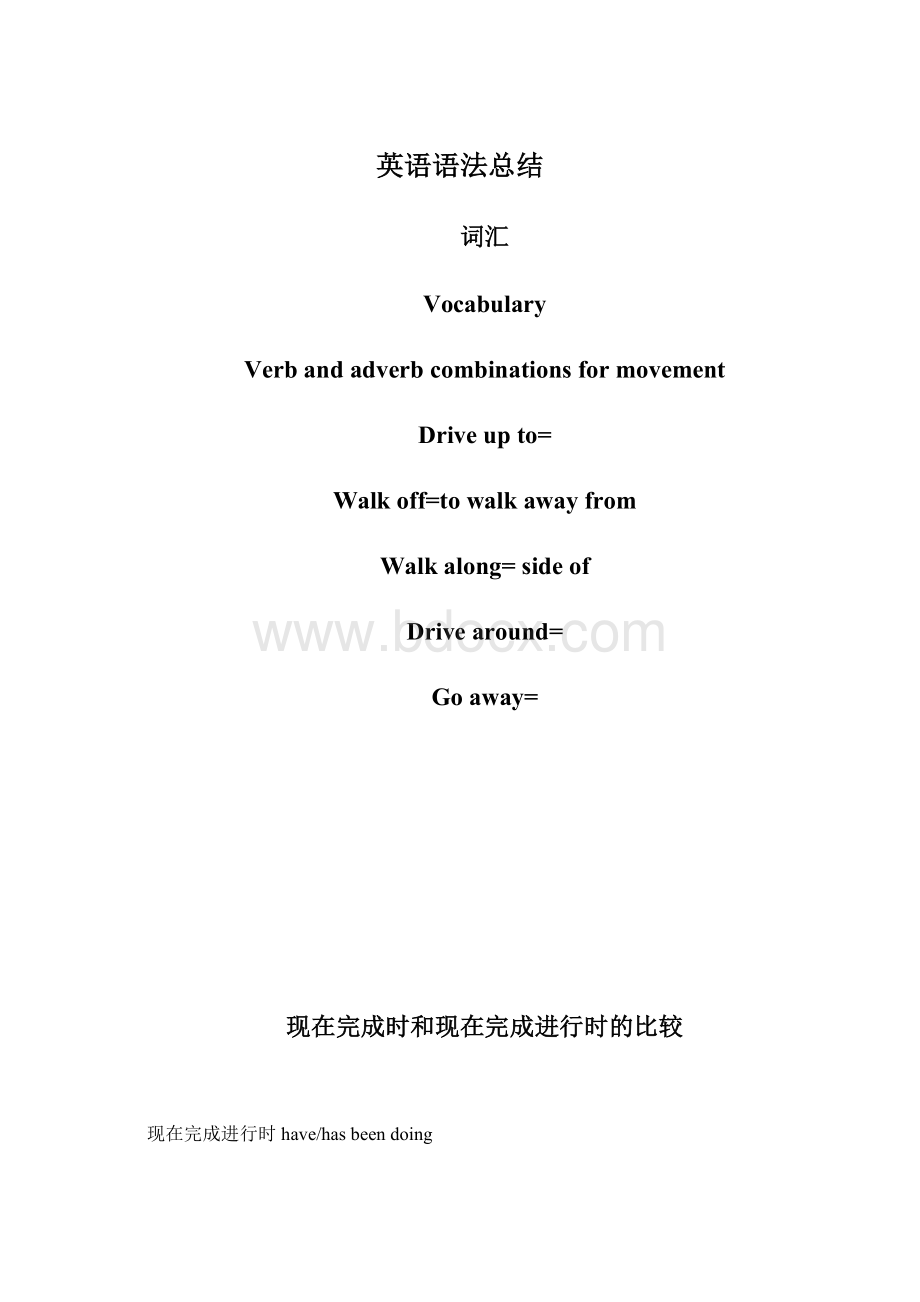英语语法总结.docx
《英语语法总结.docx》由会员分享,可在线阅读,更多相关《英语语法总结.docx(10页珍藏版)》请在冰豆网上搜索。

英语语法总结
词汇
Vocabulary
Verbandadverbcombinationsformovement
Driveupto=
Walkoff=towalkawayfrom
Walkalong=sideof
Drivearound=
Goaway=
现在完成时和现在完成进行时的比较
现在完成进行时have/hasbeendoing
现在完成时havedone
现在完成进行时是一兼有现在完成时和现在进行时二者基本特点的时态。
由于它有现在完成时的特点,所以它可以表示某一动作对现在产生的结果或影响。
由于它有现在进行时的特点,所以它也可以表示某一动作的延续性、临时性、重复性、生动性乃至感情色彩。
比较:
(1)现在完成进行时和现在完成时皆可表示动作对现在产生的结果,但前者所表示的结果是直接的,而后者所表示的则是最后的结果。
如:
a.Wehaveheencleaningtheclassroom.我们打扫教室来着。
(我们身上都是灰。
)
b.Wehavecleanedtheclassroom.我们把教室打扫过了。
(现在教室很清洁,可以用了。
)
又,(a)句表示教室刚刚打扫过,(b)句则可能表示教室是昨天打扫的。
Becareful!
Johnhasbeenpaintingthedoor.
约翰刚刚把门油漆过,现在油漆还未干,所以你要小心。
Johnhaspaintedthedoor.油漆可能已干了。
(2)现在完成进行时有时有延续性,现在完成时往往没有。
如:
Theyhavebeenwideningtheroad.(a)他们在加宽马路,但尚未完工。
Theyhavewidenedtheroad.(b)已完工了
有时现在完成时有延续性(如一些属于持续体的动词),但无临时性质。
如:
Mr.SmithhasbeenlivinginLondonsince1978.(a)史密斯先生在伦敦久居
Mr.SmithhaslivedinLondonsince1979.没有。
(3)但现在完成进行时并不总是具有临时的性质,如:
MymotherhasbeenteachingEnglishfortwentyyears.(a)无临时性质,但较口语化。
MymotherhastaughtEnglishfortwentyyears.(b)较为正式。
(a)句表示动作现在仍在继续.并将延续下去,(b)句的动作是否延续下去,须由上下文决定,但在一般情况下都是延续下去的。
(4)现在完成进行时往往表示动作在重复,现在完成时则常常不带重复性。
如:
Haveyoubeenmeetingherlately?
(a)经常相会
Haveyoumetherlately?
(b)没有。
如与often,everyday等时间状语连用,当然也表示动作在重复。
(5)现在完成进行时比较生动,有时含有明显的感情色彩,而现在完成时往往只说明一个事实,一种影响或结果,平铺直叙,没有什么感情色彩可言。
如:
Whathaveyoubeendoing?
(a)
Whathaveyoudone?
(b)
(a)句表示惊异。
(b)句只是一个问题。
Haveyoubeenwaitinglong?
(a)
Haveyouwaitedlong?
(b)
(a)句较(b)句生动。
又,(a)句比较口语化。
Ihavebeenwantingtomeetyouforlong.(a)
Ihavelongwantedtomeetyou.(b)
(a)句比(b)句更亲切,更有礼貌。
RecentlyMaryhasbeendoingherworkregularly.(a)
RecentlyMaryhasdoneherworkregularly.(b)
(a)句显然是在表扬玛丽。
(b)只说明一个事实。
下面还有一例,颇为有趣:
Who'sbeeneatingmyapples?
(a)
Who'seatenmyapples?
(b)
(a)句有强烈的感情色彩,表示愤怒不满,(b)句只是希望回答的一个问题。
又,(a)句兼有进行时态,所以有“苹果未被全部吃光”的意思,(b)句是完成时态,说明“苹果一个不剩了”。
(6)在否定结构中,现在完成时所否定的是谓语动词,现在完成进行时所否定的是状语。
如:
Hehasn'tbeenspeakingsincethreeo'clock.(a)
Hehasn'tspokensincethreeo'clock.(b)
(a)句中所否定的不是hasbeenspeaking,而是sincethreeo'clock,其结构等于Hehasbeenspeakingnotsincethreeo'clockbutsincehalfpastthree.这是因为现在完成进行时本身是没有否定结构的原故。
(b)句用的是现在完成时,而现在完成时是有否定结构的,所以(b)句中所否定的自然是hasspoken,意即“从三点起他一直沉默不语,未发一言”。
1)这两个时态的主要差别是,现在完成时表示动作业已完成,而完成进行时却不一定如此:
I’vemadeacake.我做了一个蛋糕。
(已做好)
I’vebeenmakingacake.我一直在做一个蛋糕。
(不一定做好了)
She’spaintedapicture.她画了一幅画。
(已画好)
She’sbeenpaintingapicture.她在画一幅画。
(可能还没画好)
They’vebuiltabridge.他们建了一座桥。
(已建好)
They’vebeenbuildingabridge.他们一直在建一座桥。
(可能还在建)
He’swrittenanovel.他写了一部小说。
(已完成)
He’sbeenwritinganovel.他在写一部小说。
(可能尚未完成)
2)许多静态动词都只能用于完成时而不能用于完成进行时:
I’veknownthatforalongtime.这事我已经知道很久了。
Thestrikehaslastedsixmonths.这次罢工已经持续了6个月。
Nobodyhasseenhimsincelastweek.从上周起就没人见到过他。
We’vehadterribleweatherfornearlytwoweeks.几乎有两星期天气都很恶劣。
They’veownedthehouseformanyyears.这房子他们已经拥有许多年了。
I’vealwaysthoughtyou’reright.我一向认为你是对的。
但当意思发生转变时也可能用于完成进行时:
I’vebeenthinkingofdoingsoforalongtime.我好久以来一直想这样做。
Tomhasbeenseeingaboutaworkpermitforyou.汤姆一直在设法帮你取得工作许可证。
Whichjudgehasbeenhearingthecase?
哪位法官在审这个案子?
Shehasbeenhavingatoothout.她在拔牙。
Thechildrenhavebeenlookingforwardtothisholidayformonths.孩子们好几个月来一直盼望着这个节日。
want这个动词有时可用于完成进行时,表示“一直想”:
You’retheverymanI’vebeenwantingtomeet.你正是我一直想见的人.
3)有少数动词用两种时态都可以,意思差别不大,如:
Theyhavebeenworkingverywellthisterm.这学期他们学习很好。
Theyhaveworkedverywellthisterm.
Ithasbeenrainingfortwohours.下了两个小时的雨。
Ithasrainedfortwohours.
Ihavebeenhearingfromherregularly.我定期收到她的来信。
Ihaveheardfromherregularly.
Wehavelookedformushroomsbuthavenotfoundany.我们找寻蘑菇但一无所获。
Wehavebeenlookingformushroomsbuthavenotfoundany.
强调时间长度用完成进行时比较好:
I’vebeencoughingallnight.我咳了一整夜。
(比I’vecoughedallnight.更能强调咳得久)
Allthetimeshe’sbeensittingthereinsilence.她一直静坐在那里。
Alltheseyearswe’vebeentryingtogetintouchwithhim.这些年来我们一直在设法和他联系。
He’sbeenhopingforaraiseinsalaryallthetime.他一直盼着加薪。
虚拟语气
● 虚拟语气的使用范围及判断
一虚拟语气表示一种不能实现的假设。
该语法主要用于if条件状语从句。
也可用于主语从句、表语从句、宾语从句等。
二if条件状语从句中虚拟语气的判断
If条件状语从句有真实条件句和非真实条件句。
假设条件可以实现的句子为真实条件句(如在阴天说ifitrains,wewouldnotgoout),反之为非真实条件句,要用虚拟语气。
三假设条件一般为:
1) 与过去事实相反,从句谓语动词用过去完成时,主句动词为情态动词+完成时态。
e.g.IfIhadcomehereyesterday,Iwouldhaveseenhim.
2) 与现在事实相反,从句谓语动词用一般过去时,主句动词为情态动词+动词原形。
e.g.IfIwereateacher,Iwouldbestrictwithmystudents.
3) 与将来事实可能相反,从句谓语动词用过去将来时,主句动词为情态动词+动词原形。
e.g.Ifitshouldsnowtomorrow,theycouldn’tgoout.
主句谓语动词为情态动词(should,would,could)+和相应的从句一致的动词形式。
四if条件句中如果有were,should,had,可以省去if,并使用倒装句序。
● 宾语从句中的虚拟语气
一wish后面宾语从句中的虚拟语气:
根据从句的意义来判断:
1.与现在和将来相反的事实,从句谓语动词用过去时态;
e.g.IwishIwereabird.
2.与过去相反的事实,从句谓语动词用过去完成时态。
e.g.Iwishedhehadn’tdonethat.
二表示“要求、建议、命令”等动词后面的宾语从句中的虚拟语气
从句用“should+动词原形”构成。
而且should可以省去。
用于此结构的动词有:
advise,direct,agree,ask,demand,decide,desire,insist,order,prefer,propose,request,suggest等。
e.g.Iinsistedthathe(should)gowiththem.
Hesuggestthatameeting(should)beheldtodiscussthematter.
HedemandedthatI(should)helphim.
注意:
当insist表示“坚持认为”、suggest表示“表明,显示”时,不用虚拟语气。
e.g.Heinsistedthathewashonest.
ThelookonhisfacesuggestedthathewasquitesatisfiedwithwhatIhaddoneforhim.
三wouldrather+从句
在这种结构中,从句的谓语动词用过去形式表示虚拟。
e.g.Iwouldratheryoudidthisinsteadofme.
● 主语从句中的虚拟语气
一Itbe+形容词+that….(should)….
用于该句型的形容词有:
necessary,good,important,right,wrong,better,natural,proper,funny,strange,surprising,etc.
e.g.Itisnecessarythatweshouldgeteverythingreadybytheendoftheweek.
It’snaturalthatheshouldfeelhurt.
一些名词也可用于此结构中,如apity,nowonder,…..
二Itbe+过去分词+that……(should)……
用于该结构中的过去分词是表示“建议、请求、命令”等词的过去分词。
如:
desired,suggested,requested,ordered,proposed等。
e.g.Itisdesiredthatthebuildingofthehousebecompletednextmonth.
三Itistime(abouttime/hightime)that…..(过去时动词形式或should+动词原形)…..
e.g.ItishightimeIwenthomenow=ItishightimeIshouldgohomenow.
● 表语从句、同位语从句中的虚拟语气
在suggestion,proposal,order,plan,idea,advice,decision等需要具体内容解释的名词后的表语从句、同位语从句中,要使用虚拟语气、其谓语动词为:
should+动词原形。
连接从句的that不能省略。
e.g.Mysuggestionisthatweshouldgothereatonce.
WhatdoyouthinkofhisproposalthatweshouldputonaplayattheEnglishevening?
TheproposalthatweshouldstaylongerinShanghaiwasrejected.
Definition:
Theconditionaltensesaysthatanactionisreliantonsomethingelse.Theconditionalsareusedtotalkaboutrealorunrealsituations,theyaresometimescalledif-clauses.RealConditionaldescribesreal-lifesituations.UnrealConditionaldescribesunreal,imaginarysituations.
Forexample:
Ifacertainconditionistrue,thenaparticularresulthappens.
TherearefourbasicconditionalsthatweuseinEnglish.
∙ZeroConditional
∙FirstConditional
∙SecondConditional
∙ThirdConditional
*Therearesomemoreconditionalsformedbymixingsomeofthesefour.
StructureofConditionalSentences
TheZeroConditionalisusedforactionsthatarealwaystruewhentheconditionsaresatisfied.Thestructureoftheconditionalsisstraightforward.Therearetwobasicpossibilitiesintermsoforderinthesentence:
IF
Condition
Result
If
itrains,
wewillgetwet
Result
IF
Condition
wewillgetwet
If
itrains,
*Noticethatweonlyuseacommainthefirstexample.
Conditionals:
TimeandProbabilityTable
Probability
Conditional
Example
Time
Certain
zeroconditional
Ifyouheatwaterto100degreescelsius,itboils
anytime
Likely
firstconditional
Ifitrains,Iwillstayin.
future
Unlikely
secondconditional
IfIwonthelottery,Iwouldretire.
future
Impossible
secondconditional
IfIhadthemoney,Iwouldlendittoyou
present
Impossible
thirdconditional
IfIhadseenhim,Iwouldhavegivenhimthemessage.
past
ZeroConditional:
Certainty
TheZeroconditionalisusedforthingsthatarealwaystrueaslongastheconditionismet.
Formation:
if+presentsimple,+presentsimple
IF
Condition
Result
Situation
presentsimple
presentsimple
If
youheatwaterto100degreescelsius,
itboils.
fact-universal
presentsimple
presentsimple
If
Idrinkcoffee,
Igetaheadache.
fact-personal
Intheseexamples,theresultwillalwaysoccuriftheconditionismet,sothetimeisnotimportant.
FirstConditional:
Arealpossibilityinthefuture
AFirstConditionalsentenceisforfutureactionsdependentontheresultofanotherfutureactionorevent,wherethereisareasonablepossibilityoftheconditionsfortheactionbeingsatisfied.
Formation:
if+presentsimple,+will
Forexample:
Ifshegetsgoodgrades,shewillgotouniversity.
Wearetalkingaboutthefuture,butweuseapresenttensefortheconditionandwillfortheresult.Inthiscase,thepersonissureaboutgoingtouniversity.Wecanuseothermodalverbsintheresultpartofthesentence.Forexample:
IF
Condition
Result
Possibility
If
shegetsgoodgrades,
shewillgotouniversity.
Iftheconditionismet,thenshedefinitelywillgo
If
hegetsgoodgrades,
hemaygotouniversity.
Heisnotsureaboutgoingtouniversity.
If
shegetsgoodgrades,
sheshouldgotouniversity.
Thespeakerisexpressinghisorheropinion,givingadvice.
If
hegetsgoodgrades,
hecangotouniversity.
Thismeansthatitispossible.
If
shegetsgoodgrades,
shecouldgotouniversity.
Thismeansthatitispossible,butnotthatlikely.
If
hegetsgoodgrades,
hemightgotouniversity.
Thismeansthatitispossible,butnotthatlikely.
Wecanalsouse